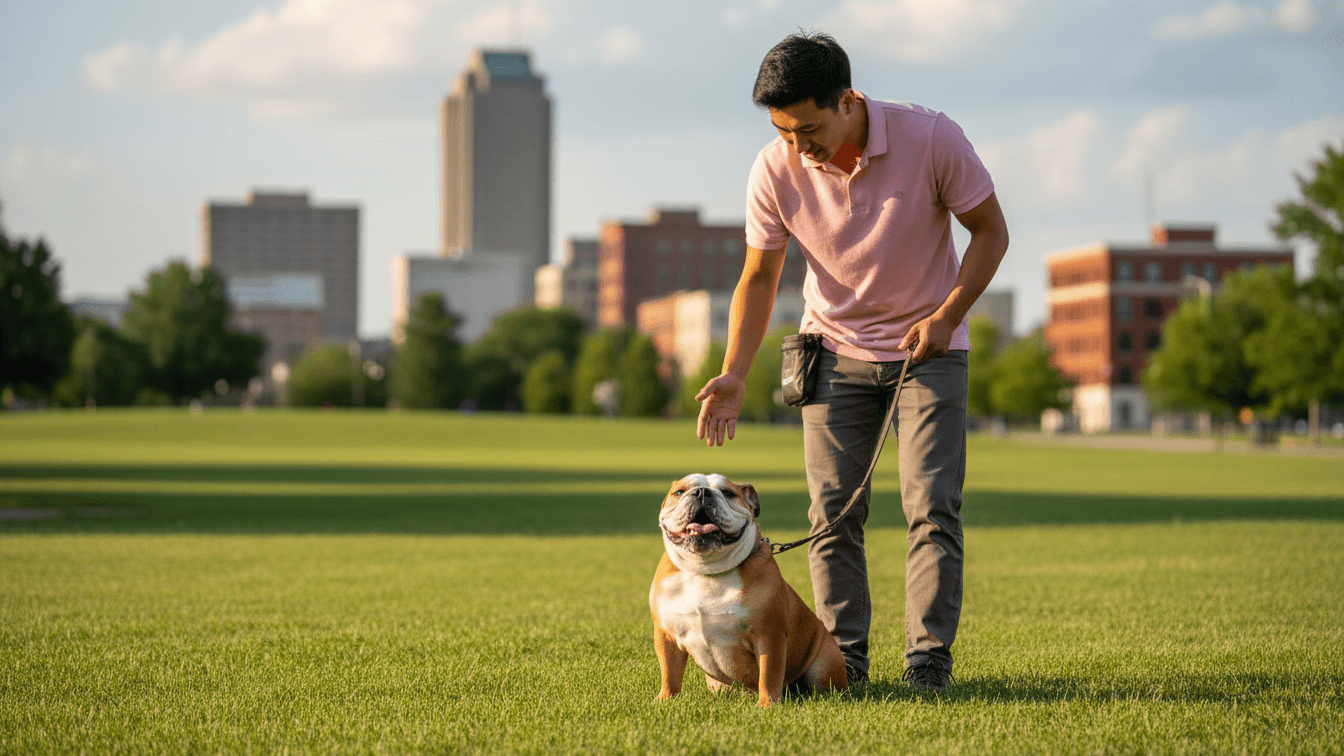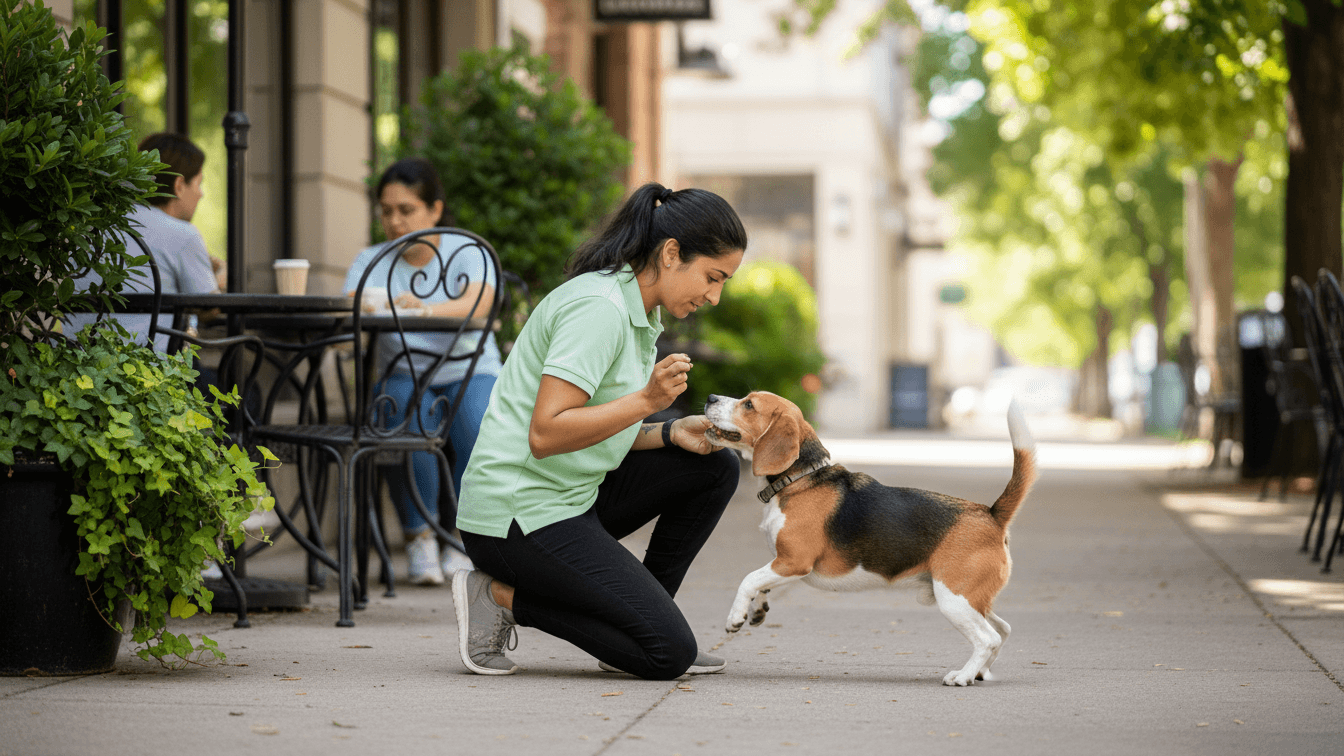Your Complete Guide to Choosing a Dog Trainer in Wichita, KS
Living with a dog in Wichita means navigating bustling areas like Riverside Park, handling the wind-driven distractions along the Arkansas River trails, and preparing for visits to local businesses along Douglas Avenue. Your dog needs to stay calm during walks through Old Town, remain focused when kids play at neighborhood parks, and handle the steady traffic noise that comes with Kansas’s largest city.
Since Wichita sits in Sedgwick County, most regulations follow city ordinances backed by county animal control standards. Finding a professional dog trainer who understands these local details makes a real difference when you’re working on leash skills near the Keeper of the Plains or practicing polite greetings at outdoor patios downtown.
How to Choose the Right Trainer
Start by looking for someone who uses positive reinforcement training and understands what daily life looks like in neighborhoods like College Hill, Delano, or Eastborough. Your training program should prepare your dog for real-world challenges, from staying calm during First Friday events to walking past the ducks at Sim Park without lunging.
Credentials help you compare experience levels quickly. Common dog trainer certifications include CPDT-KA, KPA-CTP, or IAABC-CDBC for serious behavior problems. If your dog shows aggression or severe reactivity, look for someone with CBCC-KA or a structured program like CTC.
In-home dog training works best for fixing problems where they actually happen, like door manners, barking at delivery trucks, or yard reactivity. Group classes make sense once your dog can focus around other dogs, especially before you try busy spots like the Botanica gardens or Waterwalk.
Ask about a free consultation so you can meet the trainer, discuss your goals, and make sure their approach fits your household before you commit to training sessions.
Common Dog Training Methods Explained

Reward-based methods create lasting behavior changes while building the trust you need at home and in public spaces. They also help you follow Wichita’s rules about keeping dogs under control around other people and animals.
Basic obedience covers sit, down, stay, place, recall, and leash training so your dog can handle walks, restaurant patios, and park visits without pulling or jumping. These skills form the foundation for everything else.
Puppy training focuses on socialization, potty training, bite control, crate comfort, and early leash manners. Starting young prevents bad habits from taking root, especially before your pup gets too big to manage easily.
Behavior modification addresses fear, reactivity, resource guarding, or separation anxiety through careful desensitization and counterconditioning. For serious cases involving aggressive dog training needs, ask if your trainer works with local veterinarians or veterinary behaviorists.
Private lessons and in-home sessions let you customize everything around your daily routines and your dog’s specific challenges. Day training speeds up results when you’re short on time, since expert dog trainers work your dog during the day and then teach you how to maintain progress.
Dog training classes and group classes help your dog practice good manners around distractions. The best classes screen participants carefully, give dogs plenty of space, and teach calm behavior rather than just excitement.
Specialized training like service dog training or therapy dog training requires extra structure, public-access skills, and a very clear step-by-step program with higher standards than basic obedience.
Stay away from trainers who rely on fear, intimidation, or pain to get results. Humane methods are safer for everyone, easier to maintain long term, and much better for keeping peace with your neighbors.
Average Cost of Dog Training in Wichita, KS (Updated for 2025)
Prices around Wichita and Sedgwick County depend on the trainer’s experience, session length, and whether you choose private lessons or group settings. Here’s what most local dog owners are paying in 2025.
| Service Type | Average Cost (Wichita/Sedgwick County) |
|---|---|
| Puppy classes (4-6 weeks) | $120-$250 total |
| Group obedience classes (4-6 weeks) | $130-$280 total |
| Private lessons (60-90 min) | $90-$170 per session |
| In-home coaching packages (4-6 visits) | $380-$850 total |
| Day training (trainer works your dog + handoff) | $400-$900 per week |
| Behavior consult for reactivity/anxiety (initial) | $130-$225 |
| Board and train (2-4 weeks) | $1,800-$4,200 total |
You might pay extra travel fees for locations farther from central Wichita, and expect higher rates when working on complex behavior issues that need more specialized knowledge.
Make sure you understand what’s included in the total cost, how the trainer tracks progress, and whether they offer follow-up support after your training program ends.
Questions to Ask a Potential Dog Trainer
- What training methods do you use, and how do you keep sessions positive and low-stress?
- What credentials do you have, like CPDT-KA or KPA-CTP? Do you keep up with continuing education such as CPDT-KSA?
- How will you customize the plan for my dog’s specific needs and our Wichita lifestyle?
- Do you offer in-home visits, group classes, or day training, and which approach fits my goals best?
- How will we measure my dog’s progress and know when to add more distractions?
- What are the total costs, including any travel fees, and what’s your cancellation policy?
- Do you carry liability insurance, and can you show me proof?
- For behavior problems, will you work with my veterinarian if needed?
- What should I practice between sessions to help my dog keep improving?
Local Wichita Rules and Considerations
Wichita enforces leash laws and nuisance rules to keep parks and neighborhoods safe for everyone. Sedgwick County follows Kansas state requirements for rabies vaccination and animal control.
Leashes are required in all public spaces except inside designated off-leash dog parks. Keep a standard leash with you for city parks, greenways, and downtown areas where crowds gather.
Kansas law requires current rabies vaccination for all dogs, and Wichita animal control can request proof during any investigation or complaint. You can get vaccinations through county clinics or your regular vet.
Excessive barking can lead to nuisance complaints, so work with your trainer on alert barking and separation anxiety before neighbors file reports with the city. If your trainer wants to use city parks for commercial sessions, they may need permits and proof of insurance.
Kansas doesn’t require special licenses for dog trainers, but anyone operating a boarding facility must follow state regulations. The Kansas Department of Agriculture oversees commercial kennel licensing for facilities that board dogs for payment.
Sedgwick County Animal Control provides resources for lost pets, licensing information, and local animal welfare concerns.
Local Wichita Resources for Dog Owners
These spots give you great places to practice polite manners, work on recalls, and provide safe enrichment for your dog. Always follow posted rules and clean up after your pet.
- K-96 Dog Park near 135th Street East offers separate areas for large and small dogs with plenty of space for recall practice and socialization.
- Pawnee Prairie Park Dog Park on the west side provides fenced areas where you can work on off-leash skills safely.
- McAdams Park along the Arkansas River welcomes leashed dogs on trails, perfect for building focus around joggers, cyclists, and wildlife.
- Great Plains Nature Center allows leashed dogs on outdoor trails, giving you excellent opportunities to practice calm behavior around ducks, geese, and other distractions.

FAQs
How much does in-home dog training cost?
Most Wichita trainers charge $90-$170 per in-home visit, with package discounts available when you book multiple sessions. Behavior modification work typically starts at the higher end of that range.
Is in-home dog training worth it?
Absolutely, because you’re addressing problems exactly where they happen. Your trainer can fix door manners, jumping on guests, counter-surfing, and fence reactivity right at home, then step outside to practice leash skills on your actual neighborhood sidewalks.
Can you pay someone to house train your dog?
Yes, many trainers offer puppy programs that include potty training, crate routines, and daily schedules. Day training can speed up the process while teaching you how to maintain consistency.
What is the 3-3-3 rule for dog training?
This helpful timeline applies to new or adopted dogs: expect about 3 days for your dog to decompress, 3 weeks to learn your routines, and 3 months to feel completely settled. Good training plans work with this natural adjustment period instead of fighting it.
How long will it take to reach my training goals?
Most puppies and friendly adult dogs show solid progress within 4-8 weeks if you practice daily. Fear, reactivity, or aggression typically requires several months of careful behavior modification with gradual increases in difficulty.
What should I bring to group classes?
Pack a flat collar or harness, a 6-foot leash, high-value treats, water, and current vaccination records if your trainer requests them. Leave retractable leashes at home for safety reasons.
What’s the leash law in Wichita?
Dogs must be leashed and under control in all public areas, except inside designated off-leash dog parks. That means keeping your dog on a leash at city parks, along the Arkansas River trails, and throughout downtown.
Do I need a dog license in Wichita or Sedgwick County?
Wichita does not require general pet licenses, but you must keep your dog’s rabies vaccination current. Sedgwick County Animal Control can request proof of vaccination during any investigation.
What shots does my dog need in Sedgwick County or Kansas?
Rabies vaccination is required by Kansas state law for all dogs. Your veterinarian may also recommend distemper-parvo, leptospirosis, and bordetella based on your dog’s lifestyle and exposure risks.
Are dog trainers required to be licensed in Wichita or Sedgwick County or Kansas?
No special trainer licenses exist in Kansas. Trainers follow normal business regulations, but if they offer board and train services, their facility may need to be licensed as a commercial boarding kennel under Kansas Department of Agriculture regulations.
Where can I practice off-leash recall?
Use fenced dog parks like K-96 Dog Park or Pawnee Prairie Park Dog Park to keep things safe and legal. Try visiting during quieter hours when you’re starting out so your dog can focus better.
Which dog parks allow training around Wichita?
K-96 Dog Park and Pawnee Prairie Park Dog Park both allow off-leash play within their fenced areas. These spots work well for practicing recalls, socialization, and polite greetings with other dogs.
What beaches or trails allow dogs for training?
While Wichita doesn’t have beaches, leashed dogs are welcome on most trails at Great Plains Nature Center and McAdams Park along the Arkansas River. These trails are perfect for teaching calm focus around wildlife, cyclists, and families.
What should I look for in a certified dog trainer?
Look for someone with recognized credentials who uses reward-based methods and can explain their approach clearly. A certified dog trainer should be able to show you proof of continuing education and explain how they’ll customize their program to help your dog succeed in real-world Wichita situations.
How do I know if my dog needs behavior modification?
If your dog shows fear, reactivity toward people or other dogs, resource guarding, or separation anxiety that disrupts daily life, behavior modification can help. These issues require more specialized knowledge than basic obedience training, so look for trainers with experience in these specific areas.
The right combination of thoughtful planning, humane methods, and consistent practice around Wichita’s parks and neighborhoods will help your dog become a confident, well-behaved dog. Whether you choose private lessons, group classes, or board and train options, investing in quality dog training services pays off every time you walk through Old Town or relax at a local patio with your top dog by your side.
